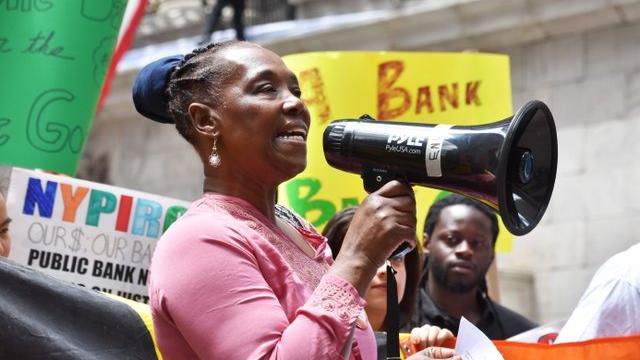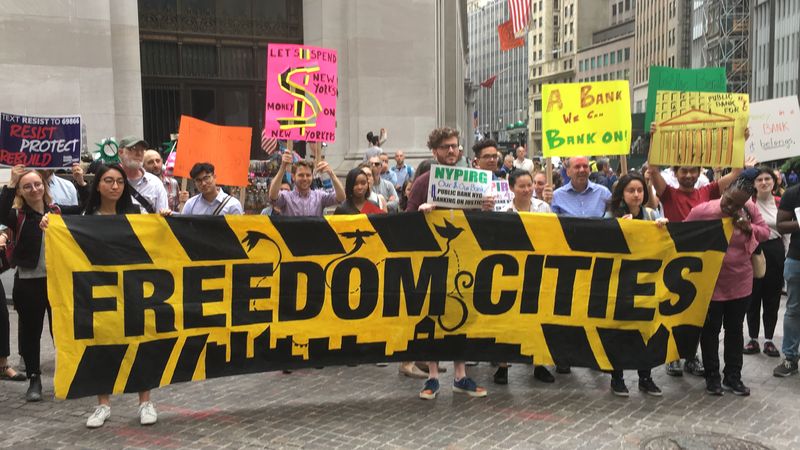
Let’s start with the obvious: 2018 was a mixed year for public banking. While American Samoa got a bank, that event was unconnected to the current mobilization efforts in the states. The defeat of the Los Angeles referendum, the silence on public banks by New Jersey Governor Phil Murphy after he’d made it part of his campaign platform, and most recently the strong rebuke of a public banking option for cannabis cash made 2018 a frustrating year for the movement.
The defeat of LA’s Measure B could still be seen as a victory for public banking advocates because in spite of knowing little about the measure – and Public Bank L.A. had miniscule campaign resources – the measure still received 42 percent support. There is no positive spin, however, on the feasibility report commissioned by California Treasurer John Chiang’s Cannabis Banking Working Group.
The report was produced by Level 4 Ventures, a business analytics firm; Jade Compliance Solutions, specialists in private financial firms' regulatory compliance; and RLR Management Consulting, which works for private financial firms. The report predicts – correctly, I think – that existing private financial institutions will incrementally offer services to the cannabis industry as prohibitions continue to dissolve.
It is also correct in predicting that a public bank dedicated to cannabis probably won’t be able to get a master account number from the Federal Reserve until cannabis is federally legal (the Fed could do it anyway but has no reason to, and is anyway risk-averse). At this point private banks will likely jump on the hundreds of billions of dollars cannabis business will be making.
The report also correctly points out that current laws create barriers to public banks, and echoes other comparable feasibility findings: that the start-up costs of a public bank are considerable, a lot of time will pass before benefits will accrue, and that public banks are subject to corruption. For good measure, it recommends rejection of “all state-backed financial institution options” as too risky; apparently even ones that nobody’s thought of yet.
Although many small cannabis product proprietors and entrepreneurs worked with the public banking movement in 2017 to discuss cannabis banking options, the group never reached critical mass. “We interviewed dozens of cannabis business stakeholders to see how we could support the industries’ banking needs,” the report quotes Molly Cohen of the San Francisco Office of the Treasurer & Tax Collector. “We found very limited interest in public banking from the industry.”
On top of a defeat in a referendum that may not even have been necessary – Marc Armstrong explains why in my interview with him here, the movement must contend with a never-ending wave of feasibility studies and policy reports that deploy capitalist logic and bourgeois economics against the case for public banks. There are now at least three California reports, a Boston Federal Reserve study, a report from Santa Fe, and others. They mostly say public banks are too risky, too expensive to start up, and unnecessary to solve the problems of financial scarcity.
The groups that prepare these reports are typically dominated by researchers deeply reliant on the private financial sector that their findings always vindicate. Public banking advocates have disputed, correctly in my opinion, many of the assumptions and conclusions of these studies. None of these reports have demonstrated that the worst-case scenarios of public banks would ever compare to the harm the private financial industry has caused, and will continue to cause, to people and the planet. But political economy is a material struggle between classes, not a debate tournament.
While the disputability of their findings vary, in one way the critics are foundationally, if inadvertently, correct: the public policy rationale for public banks is incompatible with the immediacy-driven demands of dominant financial logic. Democratic and community control of finance is the grand prize. Thus, the best hope for the public banking movement is the continued success of political candidates affiliated with Democratic Socialists of America or other socialist groups, and organizations affiliated with eco-divestment. Virtually all of those groups have put public banking into their platforms.
The policy trajectory on the democratization of finance will not stop at public banking. “Banking” may become quite a different thing in a post-capitalist economy, or it may not be a thing at all. In the meantime, the public banking movement needs to stop trying to be a bridge between those who would save and those who would bypass capitalism. The interests of capital and the interests of everything-not-capital are incompatible. We can accept that, or we can watch more highly paid contractors write negative feasibility studies until the cows come home.
Matt Stannard is director of Solidarity House Cooperative and writes, researches and teaches about cooperative law and economics. He served as policy director for Commonomics USA and communications director for the Public Banking Institute.
















